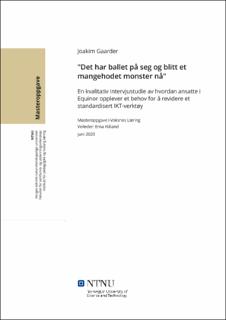| dc.contributor.advisor | Håland, Erna | |
| dc.contributor.author | Gaarder, Joakim | |
| dc.date.accessioned | 2021-09-28T17:39:36Z | |
| dc.date.available | 2021-09-28T17:39:36Z | |
| dc.date.issued | 2020 | |
| dc.identifier | no.ntnu:inspera:59477368:1888584 | |
| dc.identifier.uri | https://hdl.handle.net/11250/2784707 | |
| dc.description.abstract | Denne studien har tatt for seg hvordan ansatte i Equinor, som sluttbrukere av et IKT-verktøy, opplever behovet for å revidere et standardisert verktøy, samt hvilke funksjoner som er viktige for sluttbrukerne i det nevnte verktøyet. Studiens hensikt har vært å utvide forståelsen av IKT-verktøy som en form for standard, samt hvordan fleksibilitet passer inn i, og kan hende er viktig, i en standard.
I forskningsprosjektet er det gjennomført en empirisk undersøkelse med semistrukturerte intervjuer med fem informanter som datainnsamlingsmetode. Basert på studiens datamateriale er det utviklet fire tematiske kategorier:
• Standardisering som målsetning
• Standardisering som prosess
• Verktøyets ulike funksjoner
• Brukergrupper og verktøyets flytende natur
Studiens hovedfunn viser at de ulike brukergruppene av et IKT-verktøy vil ha ulike behov til et nytt, revidert verktøy, men at de alle deler en samme oppfatning om at en revidering absolutt er nødvendig. IKT er blitt svært fremtredende og en sentral bestanddel av de fleste organisasjoner, og de støtter opp flere ulike prosesser. Derfor er det også viktig at de er brukervennlige og intuitive å bruke. TDI-verktøyet denne studien dreier seg om, viser at verktøyet er sentralt for å dokumentere både beslutninger så vel som beslutningsgrunnlag. Det er videre både et verktøy for ledelseskontroll og et prosjektstyringsverktøy. De ansatte peker blant annet på viktigheten av brukermedvirkning ved slike revideringsprosesser og at et fleksibelt verktøy, basert på hvordan prosjekter man arbeidet med i verktøyet, er viktig. Studien viser at ansatte opplever revideringsprosessen som en minimal arbeidsbelastning og at brukermedvirkning i alle revideringsprosessens ledd kan være et viktig ledd i å sikre kultivering av allerede gode og viktige aspekter, og å videreutvikle de mindre gode aspektene av verktøyet. Studien foreslår også å betrakte IKT-verktøy som en parallell mellom en fleksibel standard og som et flytende objekt. | |
| dc.description.abstract | This master’s thesis examines how employees in Equinor, as users of a specific Information Communication Technology (ICT) tool, experience the need to revise a standardized tool. It further examines which functions that are crucial to the users of the ICT. The master’s thesis aims to expand the understanding of ICT as a form of standard, and also how flexibility fits in, and perhaps being essential, to a standard.
The research method used in this paper is semi-structured interviews with five informants as a means to collect empirical data. Based on the data material, I have developed four thematic categories:
• Standardization as objective
• Standardization as process
• Different functions of the ICT
• User groups and the fluid nature of the ICT
The key findings in this master's thesis shows that the different user groups will have a variety of needs from a new, revised ICT. They do, however, all share a perception that there is a strong need to revise the ICT. ICT has grown prominent and is an essential part of most organizations in our society. It supports a wide variety of processes. It is therefore crucial that they are user friendly and intuitive to use. The specific ICT, namely TDI, this paper sheds light on, shows that the ICT is vital to document both decisions as well as the basis of which these decisions are based upon. Furthermore, it is viewed as both a tool for management control, as well as a project management tool. The actors point to the importance of user involvement in the process of revising ICT, and the importance of having a flexible tool with regards to what sort of project the users are working on within the ICT. This study shows that the workload in participating in the ongoing process of revision is perceived to be minimal. It also points to the importance of user involvement in all of the stages in the revision process; this to ensure the cultivation of already existing aspects that the users wish to re-implement in the new and revised technology. An implication that this master’s thesis could point to or suggest, is to view ICT as a parallel between a flexible standard and as a fluid object. | |
| dc.language | | |
| dc.publisher | NTNU | |
| dc.title | "Det har ballet på seg og blitt et mangehodet monster nå"
En kvalitativ intervjustudie av hvordan ansatte i Equinor opplever et behov for å revidere et standardisert IKT-verktøy | |
| dc.type | Master thesis | |
